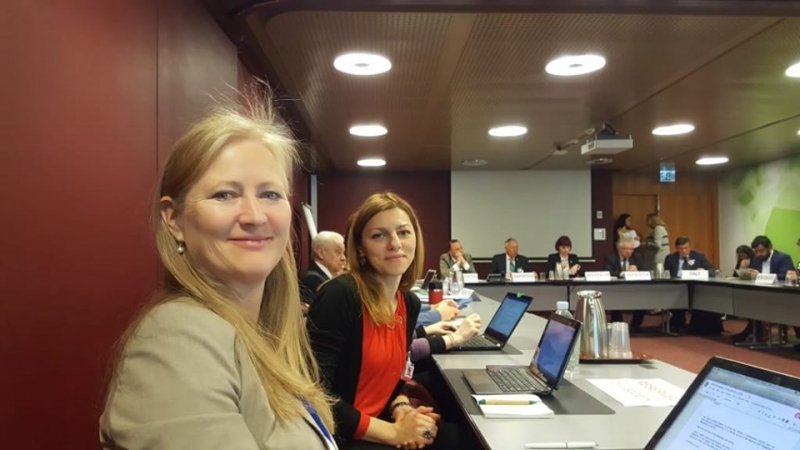Thank you chair, I would like to reflect on your question on accelerating disaster risk action.
My name is Aleksandra Radevska. I’m coming from North Macedonia, I’m part of Journalists for Human rights, but I am here today to speak as a representative of civil society, as part of the UN ECE Regional CSO Engagement Mechanism.
I would like to come back to the CASE STUDIES we just heard, and share experience from my country, North Macedonia. We have seen a number of climate related calamities in our Balkan region. In my country, we have had deaths from heat waves and floodings. In Serbia many people suffered from floods a few years ago as well. Most of the victims were women, elderly and people with disabilities.
We need much more effort to engage all of local communities and vulnerable groups in disaster preparedness, and in particular women. The past experiences from the late 20th century in our region had disaster risk reduction as a planned yearly activity at national and local level involving the community, from schools to factories and buildings. We need to reintroduce training for preparedness scenarios.This includes knowledge on emergency water supply and sanitation, including menstrual hygiene.
We also need to address the long term impacts of affected communities, who are often left alone and get no support to rebuild their lives. Insurance and funds for vulnerable communities are needed. As well as address activities that reduce our resilience against climate change. Such as unsustainable logging, for firewood, unsustainable construction and city building, that worsens heat waves. Industrialized agriculture that depletes soils, and has made us dependent on only 9 main food crops.
We urgently need to invest in community supported agriculture, in agro-ecological development, that increases local produced food, increases biodiversity and therefore food security and climate resilience. My question is how do you see pushing institutional support to urban gardens, community eco agriculture improving sustainability of pourer groups and also helping climate resilience and health in densely populated urban areas deprived of greenery and prone to heat waves, but also to air pollution.
Speaker 2: Andrea Nakova, JHR
Being a journalist first and and an activist as well, I feel the need to share some data and calls goes in hand with the need to share regional experiences, how-to tools, and good practices in coping with climate change there is a clear need for strengthening the cooperation with governing bodies in order to improve the mechanisms for adaptation and resilience.
In this sense effective, accountable and transparent institutions that ensure inclusive participation in decision-making processes, proactive disclosure of public information as well as access to information, in line with the Aarhus Convention, is also interlinking with the way we cope with environmental issues – further interlinking it to education as well.
The issue of climate is also a matter of justice and health. Governments need to accelerate the action on disaster risk, but also to emissions that affect our human right to a healthy environment. Our region, has the biggest climate emitters, peaking air pollution in hand with severe energy poverty. We need to ensure equitable access to sustainable energy, especially for vulnerable groups while minding the rule “Polluters pay”. Governments must prioritize investment in small-scale renewable energy access for low and middle incomes. But instead we are dismayed that we see investments in new coal mines and nuclear plants in my region, deforestation, destruction of biodiversity in the process also affecting local agriculture and rural sustainability. We call on you to urgently phase-out subsidies for fossil fuels and nuclear, and shift from support of business interest under the coat of improving social and economic status towards sustainable innovations and local production. we need to create local food security,in and around cities, and support food production and community supported agriculture.
Educating and adapting locally the climate action plans leads to strengthening local economic sustainability as well as better addressing the need of vulnerable groups most affected in rural and peri-urban areas.
Localization needs to be introduced into local SDG Climate risk reduction strategic plans, and involve local CSOs. Local experiences and the way it was in the past can help in creating resilience food, agro-biodiversity. Due to climate change, we are in big trouble, pollinators are under pressure, and the way to go is agro-ecology, ban all bee-killing pesticides, support organic agriculture, strengthen resilience of the soils…
I could go on and on, but you can see the pattern of information shared – local to regional to global -from us to you, in hope that together we can make better decisions that will protect our environment thus our right to a healthy livelihood. My call to you – let’s help each other in building resilience and adapt to the inevitable climate change the best we know. And let’s act now! This is our only home!




 Македонски
Македонски